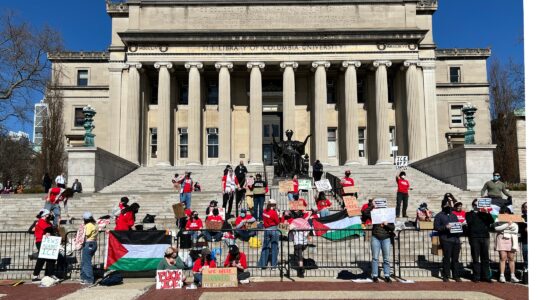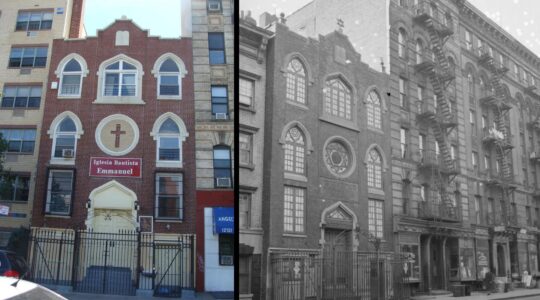Rabbi Yehuda Sarna is Skirball executive director of the Bronfman Center for Jewish Student Life at New York University. He co-founded NYU’s Of Many Institute For Multifaith Leadership, which works to promote positive Jewish-Muslim dialogue on campus.
Jewish Week: Has BDS activity at NYU been on the increase this year? What kind of effect has it had on the NYU community?
Yehuda Sarna: Two groups have mobilized over the past few months. First, a group of faculty affiliated with the American Studies Association have endorsed the ASA boycott of Israeli institutions and organized a conference promoting BDS. Second, NYU’s chapter of Students for Justice in Palestine (SJP) has become vocal and active.
Has BDS activity on campus caused pro-Israel groups to increase anti-BDS activity? What groups are working on anti-BDS efforts on campus?
The ASA resolution did not echo much on campus, and all NYU Israel clubs chose a stance of wait-and-see, rather than drawing more attention to it than it is worth. Most of the outcry came from outside the university. The student leadership is savvy enough to realize that the strategy of BDS is to distract Israel and her supporters from doing what we do best: promoting Israel as a start-up nation with an ethical core and building relationships with a broad range of potential partners.
How would you compare the strength of the two movements on campus?
In most universities, the pro-Israel community finds its support in the administration, alumni and well-trained student clubs. The BDS movement relies on humanities professors and the extreme left of the student body. The pro-Israel movement in the U.S., particularly at private universities, has a much stronger base.
How would you compare the tactics of the two sides? Have the tactics on either side changed over time?
The strategy of the BDS movement is “jujitsu”: manipulating the opponent’s force against himself rather than confronting it with one’s own force. It does something provocative, and then relies on the impulsive element within the pro-Israel community to lash out against it with full force, thereby bringing undue attention to “Israeli injustices.” There is rarely enough discipline in the pro-Israel community to withstand a provocation, and the BDS movement knows this. Once the impulsive element calls for blood, BDS has successfully branded itself the victim, reinforcing the stereotype of Israeli use of disproportionate force, of tanks facing rock-throwing youths.
What tactics do you think have been most effective at countering the BDS movement? Are there other tactics or approaches groups fighting against BDS should consider?
The goal is not to beat BDS; the goal is to have a vibrant and secure State of Israel with deep economic and political ties throughout the U.S. and the world. The best strategy is one that keeps focused on that purpose. Set the agenda, be proactive, and invite detractors to dialogue about the issues in private, low-stakes venues.
Strictly speaking, the BDS movement is more sophisticated than SJP. BDS invokes a language of human rights and civil non-disobedience, and does not engage in the kind of street theater that SJP will. SJP has stock provocations that play out on various campuses and, with the exception of student council resolutions, tends to be its own worst PR.
The use of “hard power” — suspension, lawsuits, etc. — against BDS groups usually boomerangs.
The invitation to dialogue stymies many BDS advocates. They want to debate, not dialogue. They thrive on short-term gains.
Can you describe what happened in “flyergate” last month and what has been happening in the weeks since? What was the result of the internal judicial investigation? Did the restorative justice dialogue process take place?
Last month, members of SJP slipped mock eviction notices under every door in two NYU residence halls. The administration wisely brought SJP into dialogue with the formal representatives of the residence halls to discuss their concerns regarding the style of protest, unrelated to the content. I would be very, very surprised if SJP flyered again in the residence halls since they want to avoid the positioning of “aggressor” at all costs.
This divestment effort is socially related to others. Divest from Coca-Cola. Divest from companies with poor labor track records. The tactics are identical.
How has the BDS movement affected relationships between Jewish groups and other groups on campus, in other words, have alliances been strengthened or strained because of it?
On campuses where there is no relationship between Jewish and Muslim communities, these incidents prompt the faith communities to reflexively line up against each other, leading to much larger tensions. At NYU, where Jews and Muslims have such warm relationships, the incident was much more contained. The mainstream of each community is continuously trained to approach political problems through a productive lens, recognizing that the right conditions for dialogue will get the world much further than a flier with a slogan.
The New York Jewish Week brings you the stories behind the headlines, keeping you connected to Jewish life in New York. Help sustain the reporting you trust by donating today.




